- Words Kitty Robson
- Photographer Louisa Meng
- Stylist Annie Lavie
- Makeup Artist Shelby Smith with Highlight Artists
- Hair Stylist Kiley Fitzgerald with A-Frame Agency using Davines
- Videographer Robert Marrero
- Photography Assistant Diane Lac
- Studio Studio Super LA
- Creative Production Studio Notion, Olivia Wright
- Designer Livia Vourlakidou
Daring us to be delusional, internet anthropologist Cazzie David talks her new book, debut feature film and what it means to be a human in 2025.
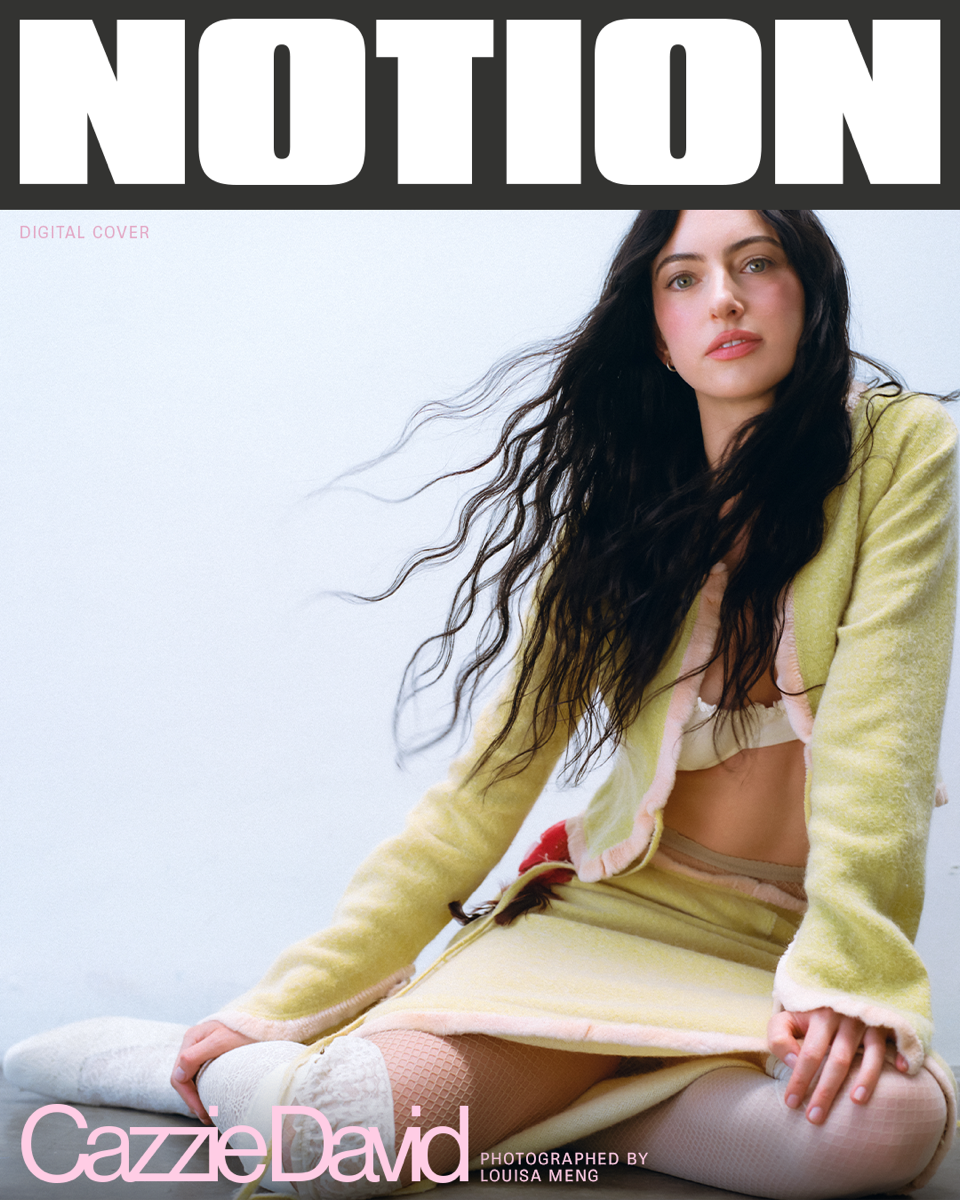
Child of the internet, writer, director, actress and self-proclaimed hater Cazzie David has made a career out of holding a mirror to the absurdity of modern life. Sometimes through biting essays, other times through sharply witty screenwriting, sometimes just through a perfectly on-the-nose Instagram caption. Known for her deadpan humour and restless mind – somewhat inherited from her dad, self-deprecating sardonic king Larry David, but mostly just the way she’s been since she could talk – Cazzie’s work dives headfirst into the anxious undercurrent of zillennial existence.
Ahead of her new essay collection, entitled Delusions: Of Grandeur, of Romance, of Progress, and the release of her debut co-directed and co-written feature film I Love You Forever, Cazzie David continues to prove herself as a voice for a generation stuck in the middle. Cursed to be nostalgic for what once was, but forced to live in the ever-changing digital age with ever-growing screen time, her astute observations on dating, identity, and infinite scrolling grant us both perspective and a pat on the shoulder saying, “I so get you”, to even the most mundane of complaints.
From the exceptionally vital storytelling of I Love You Forever – where she creates an anti-rom-com, capturing a young woman’s journey of an emotionally abusive relationship, to the delightfully frivolous musings of her first book No One Asked For This, Cazzie’s ability to capture the full spectrum of life is meritorious. As she returns with Delusions, she’s reflecting on everything from turning 30 to the subtle unravelling of self-improvement culture, the quiet absurdities of adulthood, and the uncomfortable gap between who we are and who we thought we’d become.
Talking us through her path to now, creative ventures, and what lies ahead for our latest digital cover, Cazzie David brings her signature mix of wit, honesty, and sharp observation – unpacking what it means to grow, adapt, and stay sane(ish) in an overstimulated world.
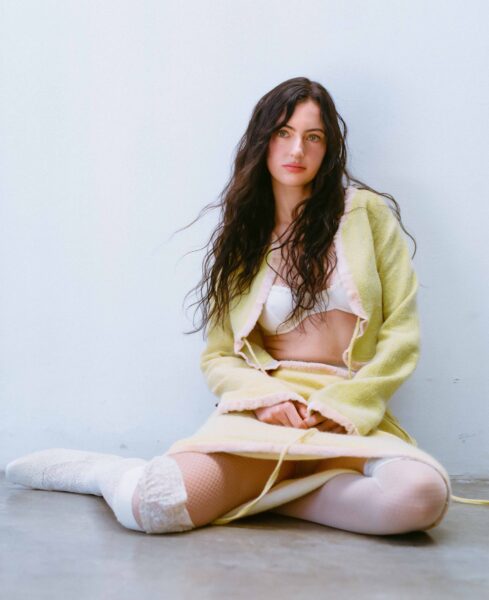
- Full look Fendi
- Bra Vintage
- Shoes Vintage
How’s your week been so far?
It’s been alright, it’s so awful everything that’s happening right now in the world. It’s hard. It’s hard to focus on yourself, even, and like, have hope or whatever?
Definitely, it’s heavy. In times like these do you find yourself wanting to write, create and express, or do you find it harder to do so?
It definitely makes it all feel more stupid. But you kind of just have to. It is tough, because it really does give you a perspective that’s hard to forget about; especially with my writing, because it’s so self-involved that it’s hard not tothink it’s a stupid thing to be doing. I mean, thankfully, I actually wouldn’t be capable of doing anything that would be better for the world, so I really don’t have a choice. It’s not like I chose something that’s worse for the general world.
I think also, arguably, that’s exactly when you need writing like that – when you need to escape a bit and think of yourself as the centre of the universe because the rest of the world’s kind of scary.
Right! I mean, I don’t want to read anything that isn’t like that. I personally only really read nonfiction personal essays. So I guess I’m contributing to the people who also can only read that.
How’s it going now with your new book? I’m so excited for that!
Thank you! I mean, it’s going well. It’s interesting because it’s so far off, so it’s weird to be done with something that isn’t going to come out for like a year. I kind of have to forget about it because I’ll think of an idea and I’ll be like, ‘Oh my God, I wish I could put that in,’ but you can’t. It’s on a manuscript, so I’m doing copy edits, but I can’t make big changes or add anything.
I love the concept, the idea of it being about your year turning 30. Right now, it feels like there’s an obsession with improvement culture online, the era of glow-ups. Is that something that came into play in terms of the context?
Yeah, I feel like turning 30 is such a benchmark for optimisation. It’s a time where you’re like, you know, simultaneously still being fed this improvement propaganda, but you’re not really old enough to notice how it hasn’t paid off, you know? The essays do hit on that. And the way that oversimplification leads people into insanity, more or less? About the way our culture brainwashes us into thinking we’re one right move away from blossoming: whether that be in regards to beauty, romance, your career, or even your mental health. That’s the lie that we’re not really old enough to understand.
What about the concept of delusion? Where did that come from?
It feels like that is the overarching theme for the book: a lot of it is about the delusions we are fed about turning 30, how you’re suddenly no longer going to hate yourself, or care what people think, or you’ll be able to suddenly say no, and you won’t be insecure. Then there are the kinds of delusions we think about throughout our 20s; things you can’t even think about if you wanted to when you’re in your 30s, like, about a guy who doesn’t like you or body dysmorphia – these things that kind of lift when you get older. Suddenly, you’re like, ‘Oh, that was actually just like a real delusion that I lived and died by. ’ The book is me waiting for that moment to hit where I don’t feel those things anymore. I guess the delusions of the pressure that we’re all under when we turn 30: to find a life partner, to cling on to our youthful appearance, even just the pressure be wiser.
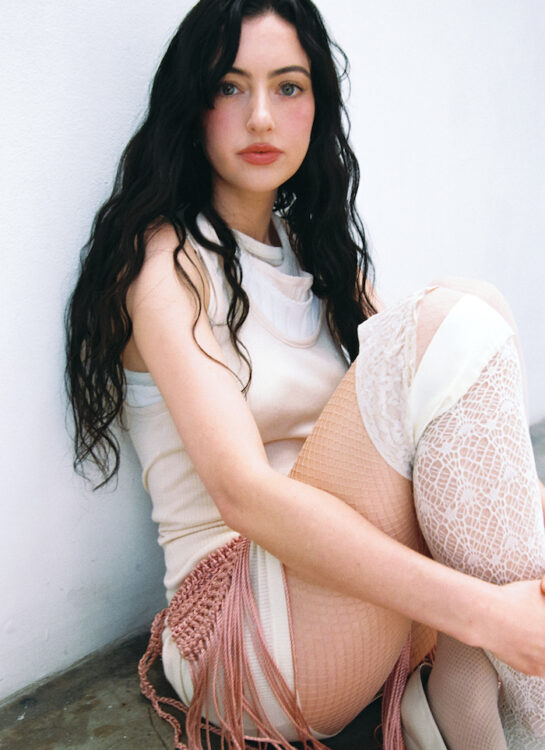
- Dress Custom
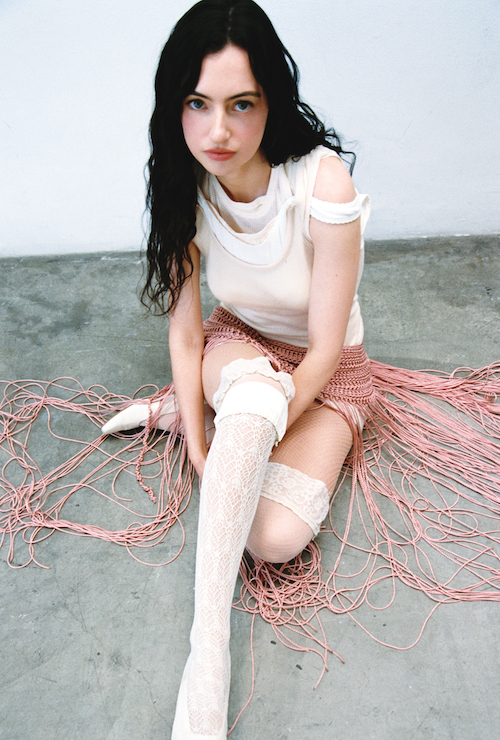
- Shoes Vintage
What would you say is one of those sorts of delusions that you really feel like you came to terms with in your 20s?
Yeah, I think there’s definitely the romantic advice complex. Something you really have to learn yourself because we’re just fed so much: about the kind of person you’re supposed to be with, who your family thinks you’re supposed to be with, what the internet says. I think that’s a big one I grapple with in the book: hearing all this advice and thinking I’m supposed to take it and that it’s right; that you’re supposed to know immediately. I was listening to a podcast the other day and this girl was like, ‘If you’re not sure, you need to break up with him now’; all this stuff that we really take to heart because you’re like, ‘Oh I don’t really, maybe I don’t know and I should’, and how that can kind of ruin your life.
Yeah, especially if you’re someone who has anxiety or whatever – if you listen to those intrusive thoughts all the time, then, yeah, you probably would be dumping people all the time.
Exactly. It’s such an important decision because it impacts the rest of your life, who you’re going to be with: it impacts your future, your future children, and generations to come. It is such a massive decision, and the idea that we have to make these really pivotal life choices at this time, when we might not really have gotten to like an emotionally mature enough place to actually make the decision in the right way. That kind of juxtaposition is funny, I think.
It feels like that really fits in with the film you’ve co-written and co-directed, I Love You Forever. Tell me a bit about how it came about?
I couldn’t believe that the concept of the movie hadn’t been done. After experiencing something similar, it felt so obvious that it was like, ‘How was this not a movie already?’ Because there’s this textbook, narcissistic relationship or emotional abusive relationship in real life that has the same kind of beginning: it writes itself, you know, being in a relationship like that. The beginning starts just like the rom-coms we were fed when we were younger. But it is such a full story: it has a middle and an end, if you’re lucky, it has an end. I felt like that story was an important thing for people to see. I was getting through my 20s and noticed there was an epidemic of people falling into this trap; it seemed like something important to educate young people about, as important as sex education. I learnt a lot of that vernacular once I was out of that situation, but I had never heard the word love bombing, or any of those words. I felt like it was important to depict what they actually mean in a palatable way. It’s a comedy at the end of the day, so it was a hard balance.
It does really lull you into the false sense of security of a rom-com, which is I guess exactly how it is in a relationship like that. How did you find acting whilst co-directing and writing?
Yeah, I mean it’s so interesting because you get so blinded by this idea of someone giving you affection that you’ve never had before. It feels like such a dream that I think even if you have seen an example like this, it only does so much. You want to be like, ‘No, let me live in my fantasy! This is everything I’ve ever wanted’. But at least there’s like something out there that you could, I think, show a friend. In terms of making the film, I identify as a writer at the end of the day, and I think if you’re acting in something you wrote, you really know what it’s supposed to sound like, or what it’s supposed to look like, which makes directing come kind of naturally. You can see the whole picture. I much prefer directing myself than having someone else direct me I am better at comedy, I’m not someone who wants to cry and fake these emotions on screen. Sophia, who played the lead, was incredible. I could never have done what she did. I had, like, a few funny lines, which is easy to do.
Yeah, but I do think you really delivered them. I feel like when you’re the ones saying the lines, I can really hear your writing. Do you know what I mean?
Oh, thank you! That means a lot.
I read No One Asked For This a few years ago, and there’s quite a lot of it that I still think about to this day. I remember reading the bit where you’re talking about how you’re so grateful it makes you miserable.
That’s so funny. Yeah, I really feel that all the time. It actually just makes me sad. It’s hard to write anything and still like it years later. I think everyone feels that way, or I certainly do. Even if I wrote something two weeks ago, I’m like, ‘That’s horrible, I’ve evolved since then. ’ I think both the books in some way, are indicative of what growing up in the so-called digital age is like. If you’re an alien and you discover a time capsule and that book’s in there, it might be helpful in the future. If that’s the only thing that comes out of it, then fine. It’s funny because it’s like the hesitancy for me with a second book feels like, you know, you want it to be better than the first, obviously. But there’s still an embarrassment if you evolve too much, because it really shows how unevolved you once were, you know? So you’re kind of towing the line where you want it to be a slight ascension, but nothing that’s like, ‘Wow, you used to really suck, ’ you know? Or if I really got much better, that would be clear. Thankfully, I don’t know if I did. I think it’s a slight ascension.
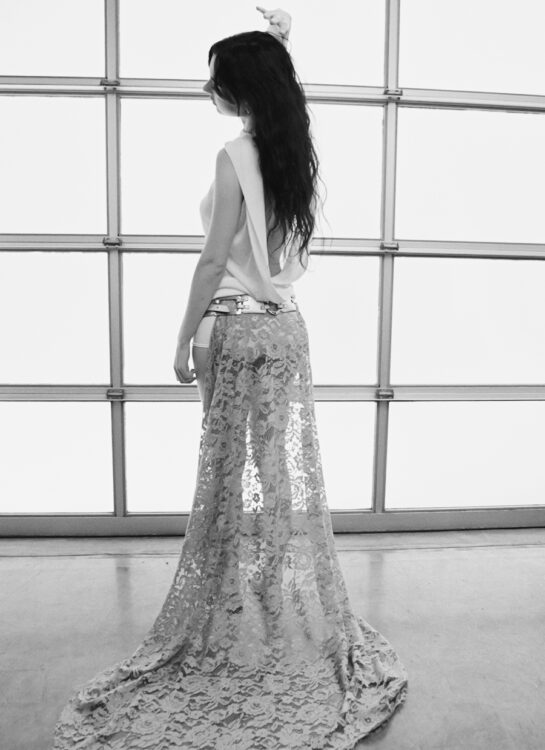
- Top Geel
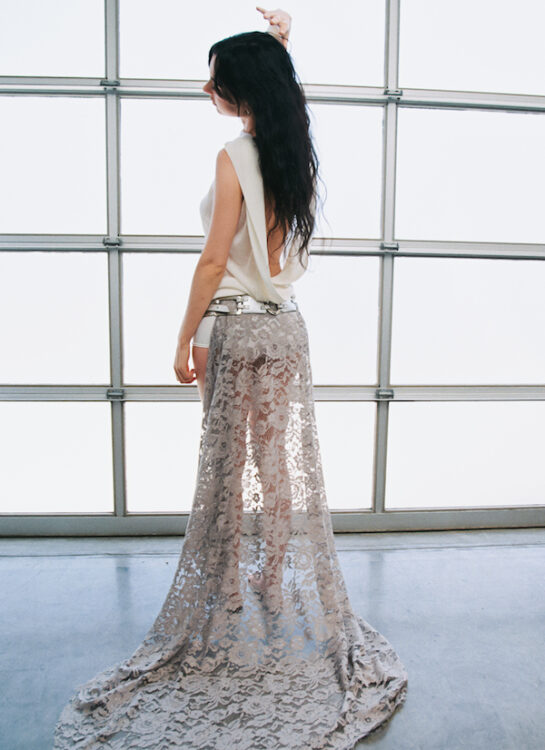
I love the way you look at digital intimacy too: how do you feel looking back on writing about that then, five years on?
I still really agree with that. I always write about the same kinda themes. It was actually hard for me to come up with a new big take on the internet in general for Delusions, because that does really ring true to me. I think just writing about the addiction in general, like me grappling with this real addiction that we all do and calling it out for what it is, it’s interesting. I’m writing about it as if it’s like any other addiction someone would have.
It’s interesting because it’s something that I feel like people on the internet talk about in this rather meta way.
It seems like something we just accept. Like, we don’t have a choice. I think there’s possible overlapping ideas in that, I was too embarrassed to go back and read it because I didn’t want to have those feelings of ‘I can’t believe I wrote this.’ So I was like, hopefully they’re not the same, but I’m not gonna look!
No one’s gonna call you out, don’t worry.
Yeah, hopefully not, you never want to have too much visibility, where people can actually dissect things and call you out. You want to fly under the radar.
How does it feel to be writing in an environment like LA? You’re writing about anxiety and the way that the world feels, and I feel like LA is the centre of that in lots of ways.
This year has been horrific there, to say the least. I try to write about things anyone in any place can relate to, despite my upbringing. They’re all very general topics, if not just personal stories. With the fires,, it was a bit of a realisation like, ‘Oh, is imagining living here for the rest of my life a fantasy?’ Is it like we all have to decide what the natural disaster we’re the least afraid of is, to find a place to live? I don’t think it’s sustainable to live here forever, even though I want to, and that sucks. It’s sad because it’s such a beautiful place, I think it’s the most amazing place to live, but it’s been very tragic.
What about the celebrity culture side of it? Does that impact you and make you hyperaware of that realm as a writer?
I really just find most celebrities to be pretty diseased. I really don’t leave my house. So I don’t know how impacted I am by any of it. I think it’s interesting to see a new generation grapple with fame, with the internet and how different they are as people compared to older generations. I think I was lucky just to grow up when I did.
I guess arguably because of the internet, that culture’s on everybody’s doorstep now compared to maybe what it would have been like if you wrote in LA in the pre-internet era.
Yeah, I think I would have really thrived in a different time. Our generation doesn’t really appreciate the hater as much as the past generations have.
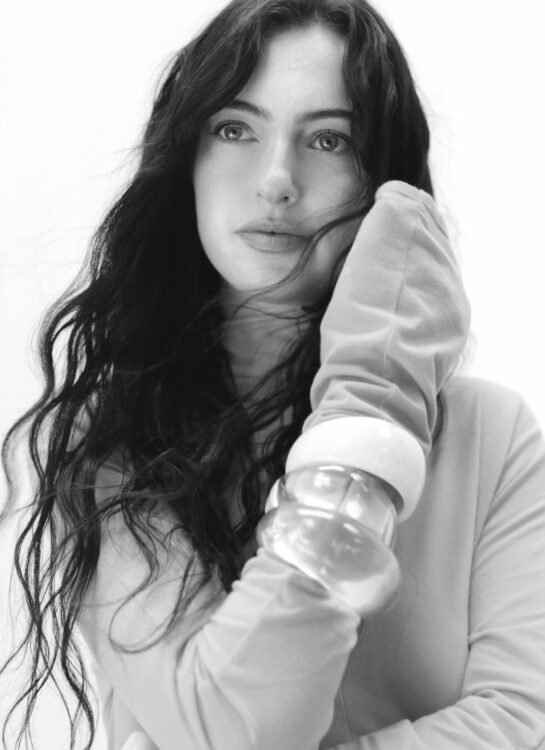
- Dress Colleen Allen
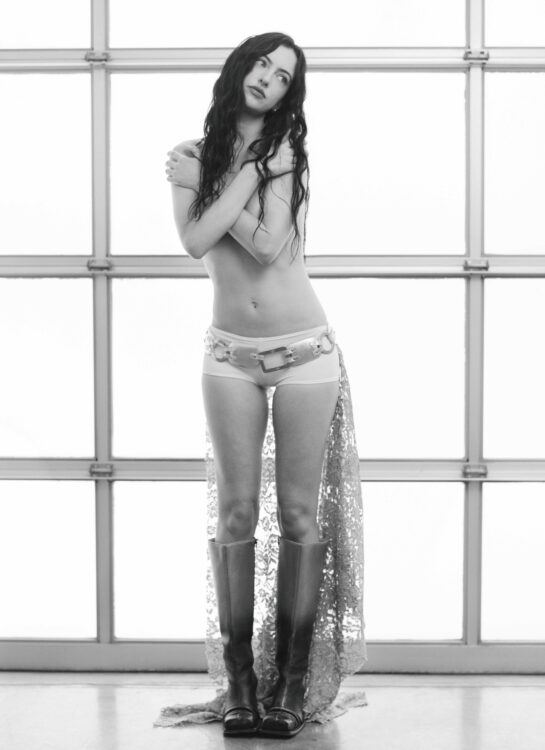
- Shoes Fidan Novruzova
That’s so true!
I come out and I’m trying to criticise something, and people are like, ‘You’re a hater, you’re a hater’. But Fran Lebowitz is beloved. I’m not saying I’m anywhere as smart as Fran Lebowitz but…
No, but you’re right. There’s definitely a bit of an anti-criticism movement right now, in music as well! ‘They Don’t Build Statues of Critics’ kind of thing.
Yeah, we’re definitely not appreciated the way we want.
How did it feel writing Delusions compared to writing No One Asked For This? Did it feel emotionally and creatively different?
I think writing a second book requires some… Have you heard of childbirth amnesia? You kind of have to forget the pain of having a child in order to even think about the idea of having another one. I think a lot of it was that. There were times when I was like ‘Oh, I’m never doing that again. That was horrible. Just the best for the living through the reception of it and working for years on something that is ripped to shreds or judged in any way. I was super young, obviously, and didn’t really have the wisdom to be like, ‘Oh, this is all part of it’ or whatever. I think it required some childbirth amnesia to start writing the next one. Now I’m starting to remember a little bit about what that was like and it’s all coming back to me and I’m I’m scared to birth again.
How did you find drawing inspiration in this new time? Did you find any unexpected muses?
I think just this time of anyone’s life – the pressure of turning 30 – I found that to be really high stakes in a funny way. There’s a lot of comedy in that and how we’re all just flailing. A lot of my friends and I’ve noticed in myself, we’re just trying to get our lives together as quickly as possible to set the next decade up for success. You’re kind of just guessing what it is you’re supposed to do without any of the maturity to know what it is. It would have been useful for me to have seen somebody else move through that: some parts of it do feel like a guidebook to turning 30;I feel like that would have been helpful. There is a lot of material on the subject, but it’s really the juxtaposition of these huge pivotal life choices and the trivial actions that you make going about them that I found to be really funny, so I was inspired to do the whole year leading up.
Well, I turn 30 next year, so that’s a perfect time for your book to come out for me.
Perfect, yes, it’s actually only for people exactly your age. No, but I really hope a lot of 29-year-olds read it.
Did you find yourself looking back a lot? Do you remember pivotal books, like this could be for someone – in your upbringing or teenage years?
I’ve always read personal essays. I always read David Sedaris, those books were really the ones that stuck. Sloane Crosley, too. They never really felt like reading to me. I was really ADD, so it was hard for me to read. Yeah, I wrote a book, and it was hard for me to read. All right? It’s so not a big deal! Lena Dunham’s book is still one of my favourites: it’s just so raw and it makes me feel better about the things I share, because she just doesn’t give a fuck. I mean, maybe she does, but it doesn’t seem like she does and that’s really cool. A lot of Nora Ephron. Anyone who wrote personal essays, I’ve probably read them.
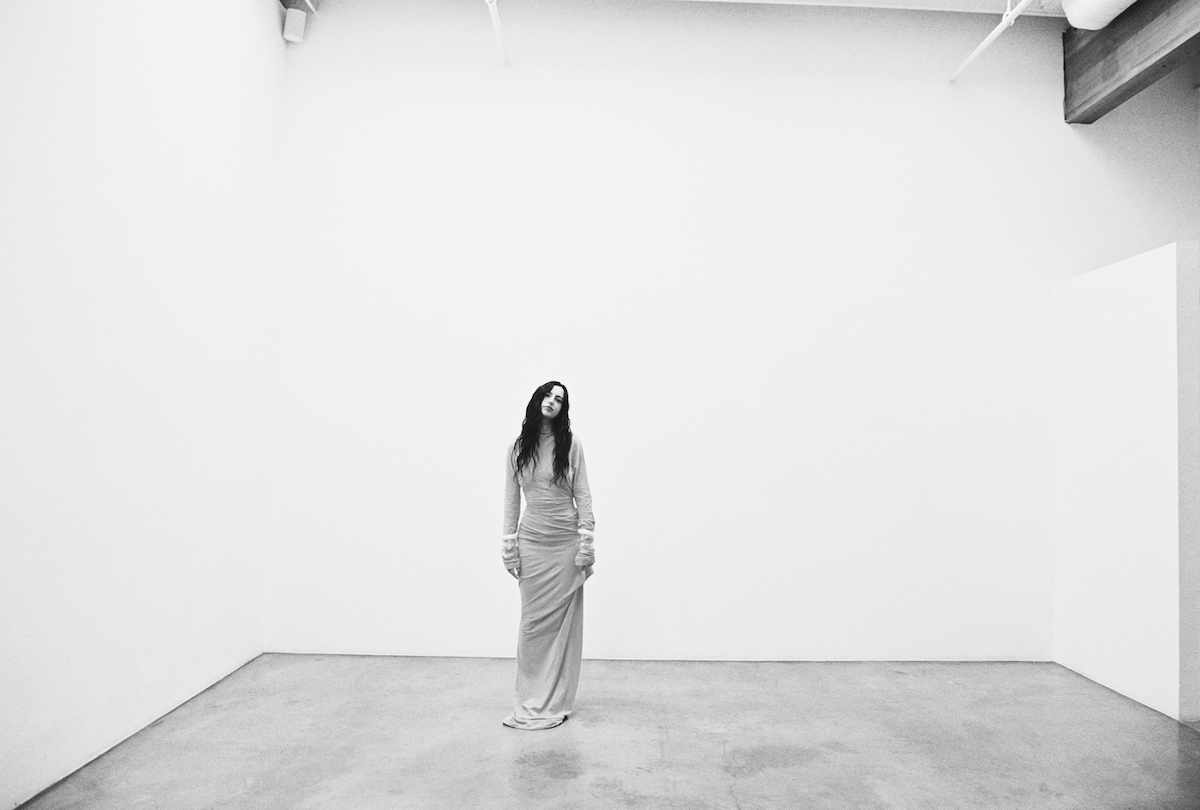
How about making I Love You Forever, where were you looking for inspiration?
We were definitely inspired by just the most stereotypical, romantic comedies possible because we wanted to satirise things that have been done a lot. Grand gestures and meet-cutes and compliments; those initial connections in rom-coms that we really wanted to nail. There were some thrillers we watched to educate ourselves on a mixed genre concept. Diablo Cody was our producer and she’s like my hero: how she’s able to materialise her vision and maintain this distinct comedic voice throughout her films. That’s something I strive to do:to have a really distinct comedic voice. In writing, I look up to Elaine May, she had such a versatile career and had really strong comedic instincts. I love how my dad [Larry David] likes to make the big things in life really small, comedically, and the small things super big. I get very passionate about petty injustices, so something like that really comes easily to me. I think my taste in comedy in film and TV tends to be more on the grounded side.
Yeah, it’s interesting because right now there is a bit of a rom-com renaissance, a bit of a resurgence of that genre. How do you feel about that?
I think it’s great, I love rom-coms. I think the anti-rom-com definitely feels like a revolt for women who are fed so many of these stereotypical love stories we had growing up, and how they just had such a negative impact on the course of our lives. When you grow up and start dating, those films can actually deter us from learning what the reality of healthy love looks like. I imagine we all could have gotten to that conclusion a lot sooner if we had grown up with movies that were not selling us a fairy tale, and maybe were more real. Like, finding someone who is 75% of everything you’ve ever wanted, but not 100%, and having it be romantic still. I think it’s interesting that being sold these fairy tales can actually have a dangerous impact. It’s so silly, but it’s true. I think the more movies that can serve as warnings or just even reality, the better. But I love a silly rom-com, we need those too.
What’s next for you?
I’m just mentally preparing myself to go through the horror of releasing this book. The industry is so unpredictable and generally challenging. There are no guarantees, but hopefully there is something next. My biggest issue is that I have too much material and very few outlets to put it in. There’s so much in this book, but there’s certain material that can’t transfer to any type of genre. Having an outlet would be really cool for some of the material I have, which usually requires multiple people to believe in your work and make it happen. It’s not impossible; it has been done before.
I believe in you!
Thank you! Any chance you own a streaming service?

